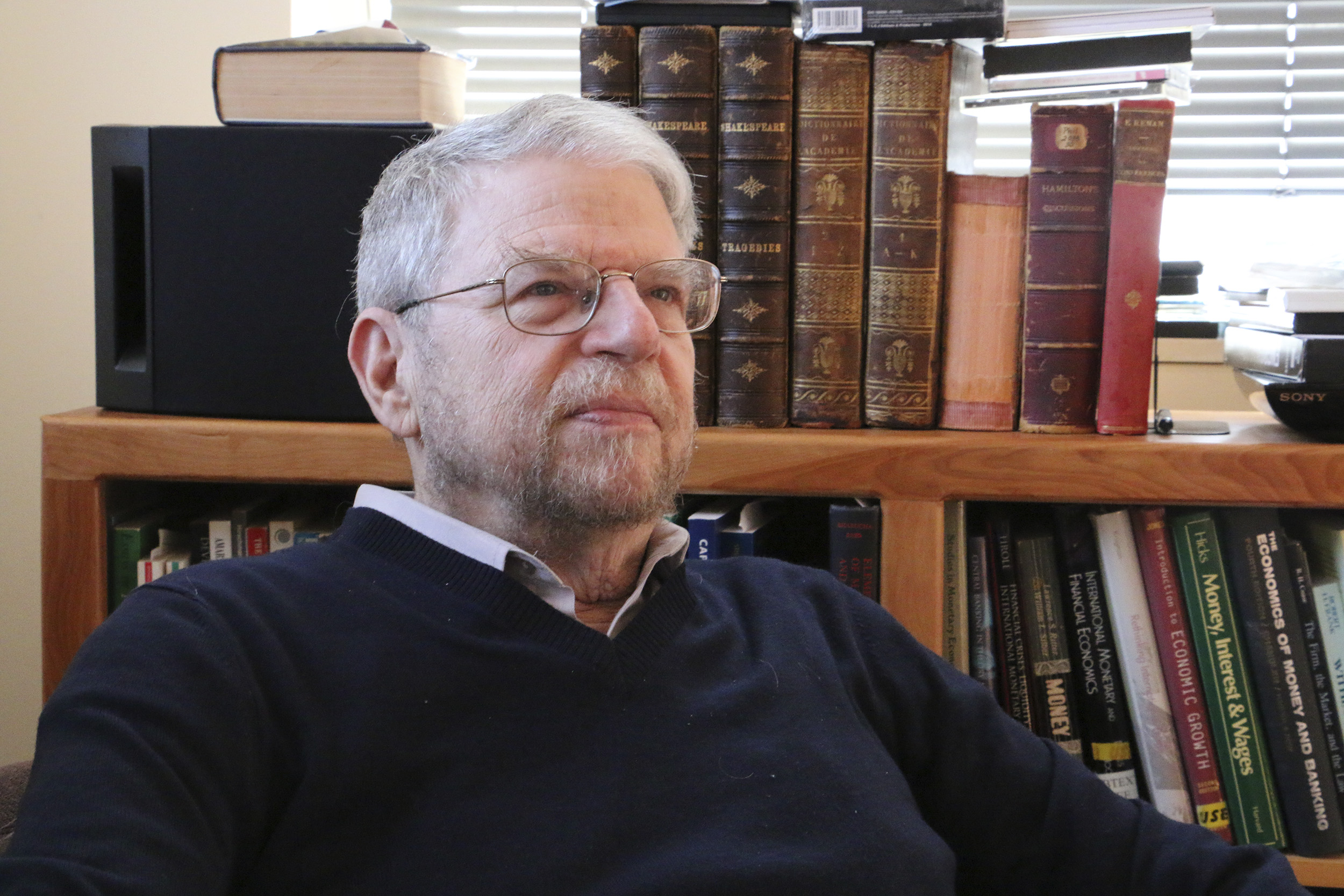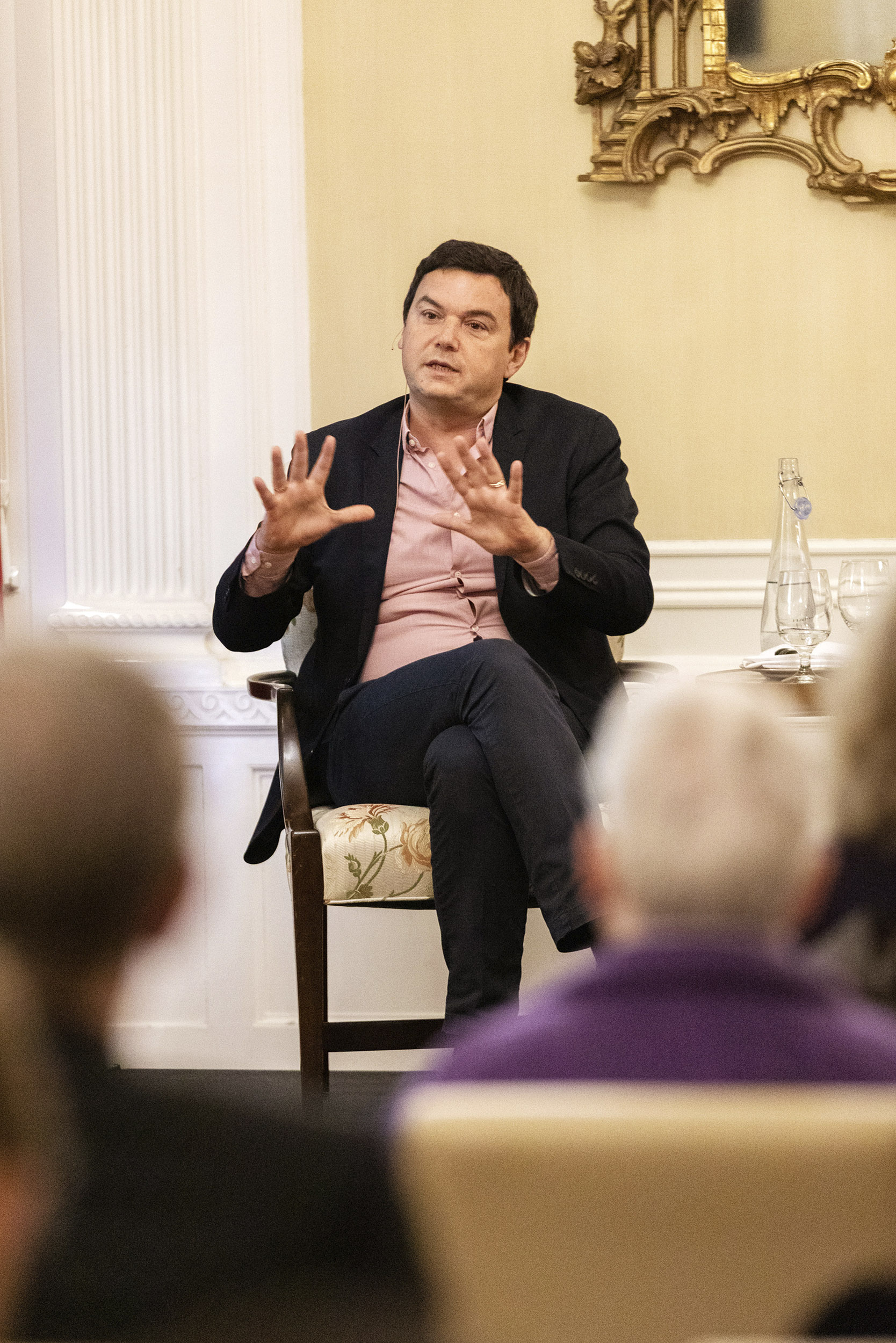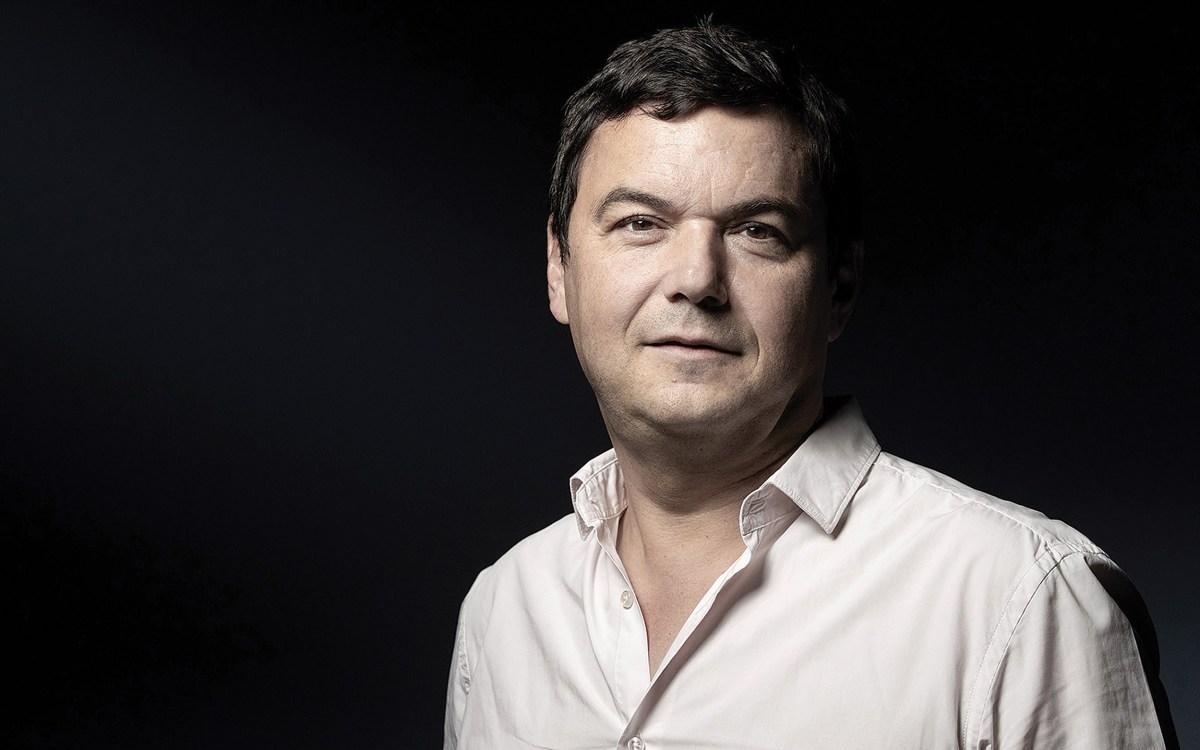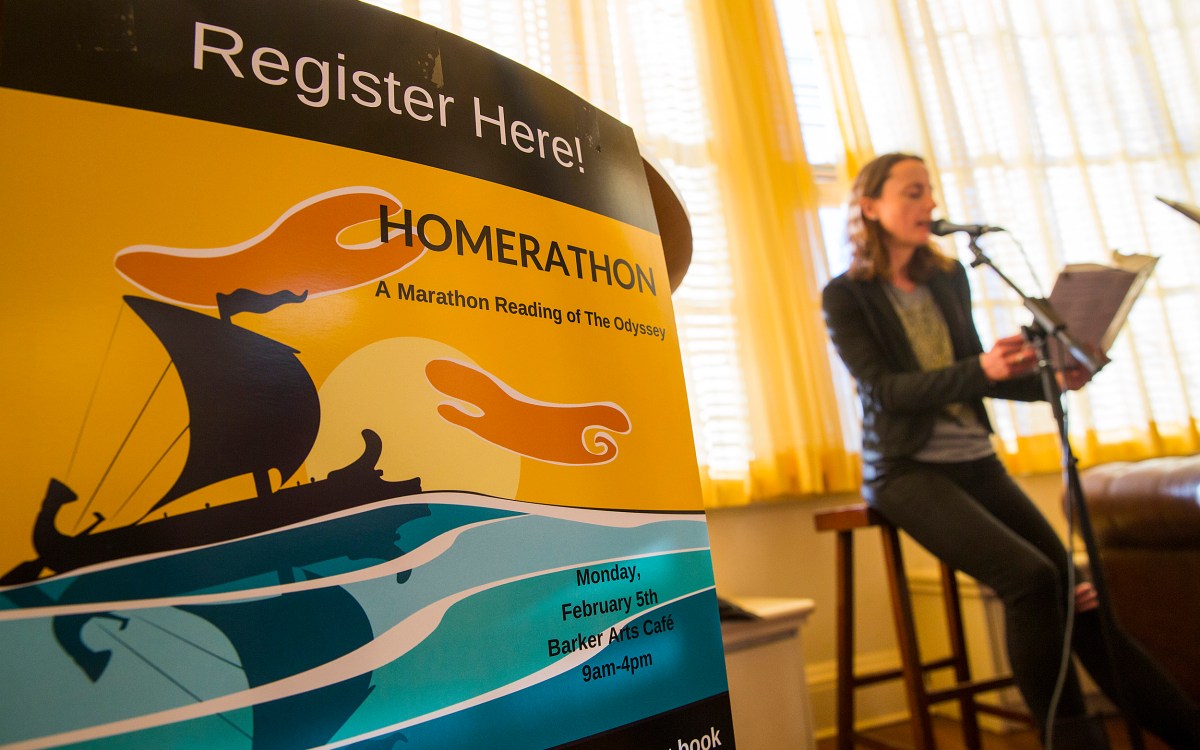
Arthur Goldhammer talks about the three elements of a great translation and his circuitous route to success in a field he never studied.
Photo courtesy of Arthur Goldhammer
In translation, he found his raison d’être
Arthur Goldhammer looks back on a life bringing the work of Thomas Piketty and others to readers of English
Surely there are more direct routes to becoming a respected French-language translator than going to Massachusetts Institute of Technology (MIT) for a Ph.D. in mathematics, getting caught up in the Vietnam draft, and then ditching a teaching career and moving to France. But for Arthur Goldhammer, it was a circuitous path that made perfect sense. A New Jersey native with no formal French-language training, Goldhammer translated more than 125 books on French history and politics, as well as classic texts by Albert Camus and Alexis de Tocqueville, for leading academic publishers including Harvard University Press. In 2014, he achieved some celebrity after producing an English version of a book about global inequality by a young French economist named Thomas Piketty. That opus, “Capital in the Twenty-First Century,” sold more than 2 million copies. Piketty’s follow-up, “Capital and Ideology,” published this year, was Goldhammer’s last translation before retirement. Besides translating, he’s an author and essayist on contemporary France and French politics, and has taught at Brandeis and Boston universities. Goldhammer has close ties to the Minda de Gunzburg Center for European Studies at Harvard that date back to the 1970s. He’s currently a local affiliate and chair of the New Research on Europe seminar there. Goldhammer recently spoke with the Gazette about his unusual journey.
Q&A
Arthur Goldhammer
GAZETTE: You have a Ph.D. in math from MIT and yet you’re a leading French literary translator. How did that happen?
GOLDHAMMER: Growing up in New Jersey, I was very good at math and science. I left high school at the age of 16 because my parents moved from New Jersey to South Carolina and the high school there was so backwards that I had already done the courses they had to offer. So I applied to MIT and was admitted with a scholarship. Although math and science were my strong suits, I was quite interested in literature. I had studied the French language starting in the eighth grade and was really influenced by a number of French novelists from Stendhal to Proust, so that encouraged me to continue my reading of French, although I never formally studied it.
“Clarity is, of course, important. But for me, the really important thing in translating, even prose, is that all writing has a kind of music to it.”
I graduated from MIT in ’67 and started graduate school there in ’68 as the Vietnam War was heating up. In the summer of ’68, I went to France for the first time. In those days, you had to notify the draft board when you were leaving the country. And my draft board, which was in South Carolina because my parents had moved there, chose to interpret my traveling abroad as a declaration that I was no longer in school even though it was between my first and second years of graduate school. So they took that as an opportunity to draft me. When I got back from France in September, I found my draft notice waiting. I appealed, and the appeal went all the way to the head of the Selective Service board, who actually ruled in my favor, but he declined to overrule the local draft board. He referred my case back to them with his recommendation that I be given a graduate school deferment, but they refused. So, at that point, my only choice was either to leave the country or submit to being drafted. So I decided I would take my chances with the Army.
It was in the interim years between the institution of a draft lottery and the universal college student deferment, so they were not getting many people who were college graduates going into the Army at that point. Whenever they did get one, they tested for foreign language knowledge. I was given a French language test and apparently scored very well on it. And that, coupled with the fact that I played a musical instrument, led them to select me for Vietnamese language training. The musical instrument part is because Vietnamese is a tonal language. So I wound up learning to speak Vietnamese, became moderately fluent, and was sent to Vietnam as part of an intelligence organization.
GAZETTE: You were working for the CIA or U.S. military intelligence?
GOLDHAMMER: I did some liaison work with the CIA, but I was in military [intelligence]. I ended my military service three months early and came back to MIT, where I finished my Ph.D. But my time in the Army had changed my priorities. I had fallen in love with Paris and wanted to spend some time in France. I also wanted to write fiction. I wanted to pursue some studies in history because I wanted to understand better what led to the United States’ involvement in Vietnam. But I didn’t have enough money to quit the path I was on. I was still being supported by a fellowship from the National Science Foundation. I figured that my best course was to continue in math, teach for a while to save up enough money, and then see how things turned out.
I got a job at Brandeis and taught there for two years as an assistant professor. After two years of teaching, I’d saved up enough money to support myself for a year in France. I decided I would quit and go off to Paris to live for a while. I had met someone in France who was working for a French sociologist named Michel Crozier. He had just finished a book that he wanted translated into English. My friend was working for him as his assistant so she persuaded him that I would be a good person to translate this book. I had expressed to her my interest in becoming a translator to support myself. That became my first published translation. That got me connected with the University of Chicago Press, which was a very important connection because they happened to have a backlog of books in French history by a number of well-known historians. After they got my translation of Crozier, they decided to try me on a couple of these books.
For the next five years or so, I had a steady stream of work from the University of Chicago Press. Had it not been for that, I probably would not have remained a translator because the hard thing for a freelancer is to break in and get steady work. After the first five years, my reputation was established. I got work from other presses, including Harvard University Press [Piketty’s American publisher], which became my mainstay after Chicago for quite a number of years, and that kept me going for a very long time.
GAZETTE: What about translating appealed to you? Isn’t it all of the hard work of writing and none of the glory, so to speak?
GOLDHAMMER: My real ambition was to become a novelist, and the advantage of translation was that it enabled me to have complete control over my own time. I could write in the morning and translate in the afternoon, and that’s the way I lived for many years. It took me a long time to finish my first novel. It was not very successful, so I continued working as a translator. In the meantime, I continued to write fiction. But I’ve been quite successful as a translator and not successful as a fiction writer. So that’s the reason I stayed with translation. It’s true that I probably could have done other things that would have brought me more glory and certainly earned me more money, but I enjoy translating. I liked the fact that it enabled me to go from one subject to another. I’ve always had many interests, as my interest in math and physics and literature as well as French history and so on would indicate. And translation was a way of sustaining many interests because I spend three or four months on a book and then move on to a book on a completely different subject. I liked that lifestyle.
GAZETTE: How do you decide which projects to take on?

GOLDHAMMER: It’s the author; it’s the subject. Usually there’s time to read if not the entire book, at least a sample. Sometimes you don’t have the entire manuscript in advance, but some part of it is available so you can read and make a judgment. That’s not to say that I haven’t translated some books in my career that I didn’t like very much or with which I disagreed, but that’s OK. I don’t mind translating books with which I disagree. Now, in some cases, I did meet the author before agreeing to translate the book, especially after I became better known and had lots more contacts in France.
That was the case with Piketty. I met him when he came to Harvard to give a lecture before he published “Capital in the Twenty-First Century,” which came out in 2013. I met him even before the book was published in French. We had a very good rapport. He [later] credited me with helping to make the book into a best-seller because, although it had sold well in France, it was not going to be a global hit. It was the English translation that brought all the publicity to the book and turned it into a global bestseller.
GAZETTE: What’s your work process like? Do you involve the author while you’re translating or steer clear of them as much as possible?
GOLDHAMMER: I find that it’s good to consult with authors just because authors are understandably uneasy about being translated, especially if they feel they don’t speak the language particularly well. So you want to reassure them and the best way to reassure them is to work with them. My general process is to translate a chapter and send it to the author if the author wants to be involved — most do; some do not. And then, if they have comments, we discuss their comments. Usually, when I get the book, I start right in translating it. I will sometimes read the whole book before beginning translating, but that’s not always the case. I usually find that the first couple of chapters require more revisions than the later chapters. It takes some time to work yourself into the style of each author. But once you’ve done that, it becomes more natural.
GAZETTE: What is your overarching goal? Is it to maintain the author’s voice and the nuance of that, or is it to make the text clear to an English-language audience? French and English are so structurally different, and culturally different as well.
GOLDHAMMER: Clarity is, of course, important. But for me, the really important thing in translating, even prose, is that all writing has a kind of music to it. You really want to catch the note of the author. Every author has a different timbre, a different voice, and you really want to get that voice insofar as possible. I find that maintaining the rhythm of prose is the essential thing for me. In fact, it’s so important that I find that I can’t translate while listening to music. There is a musical quality to prose as I read it. I hear it in my head, and I don’t like that inner voice to have any competition, even from good music.
GAZETTE: The late Gregory Rabassa, the distinguished Spanish translator of Gabriel García Márquez, Julio Cortázar, and others, spoke of the translator as inhabiting the world of both the writer and the reader at the same time. What makes for a superlative translation?
GOLDHAMMER: I think the essential criteria of a good translation are, first, to preserve the music of the original text. Second, particularly in translating nonfiction, to convey with maximum possible clarity, the ideas that are embodied in the text. And third, not to tamper with the author’s way of representing him or herself. By faithfully representing the author’s voice and manner of self-presentation, the translator is discharging a duty to represent the author faithfully. For me, that’s really essential.
GAZETTE: Freelance writers and editors get paid by the word or the project. Is it similar for translators?
GOLDHAMMER: Throughout my career, it’s usually been by the word. On a few books, I’ve gotten royalties in addition to the word rate. I did not get royalties on the first Piketty book, unfortunately. Normally, when you get royalties, you get less of an advance. So it’s risky, particularly for a nonfiction book, to take royalties.
GAZETTE: You’re best known for the Piketty books, but are there translations you are especially proud of?
GOLDHAMMER: There are two authors of whom I’ve translated many books whose styles I thought were particularly difficult to do well and to which I thought I did justice. The first is Alexis de Tocqueville. I translated all of his major works, including “Democracy in America,” “The Old Regime and the French Revolution,” and his memoirs, titled “Remembrances.” And then I did several of the literary critical works of Jean Starobinski. His style is very difficult. Both of them are elegant writers, so their work required particular care, and both had strong literary qualities. I think I did justice to them. Those are the books I’m most proud of.
GAZETTE: Now that you’ve translated your last book, what’s next for you?
GOLDHAMMER: I’ve gone back to fiction full time. I’m now working on a novel about physics. I’ve returned in a way to my previous life as a physicist and mathematician. The new book is about two physicists. It’s a historical novel set in the 1930s and ’40s and involves both a love triangle and the atomic bomb — two explosive elements, as it were. It’s about one-third done, and now, with the COVID-19 crisis and no more paid work, I should have plenty of time to finish it.
Interview was edited for clarity and length.






